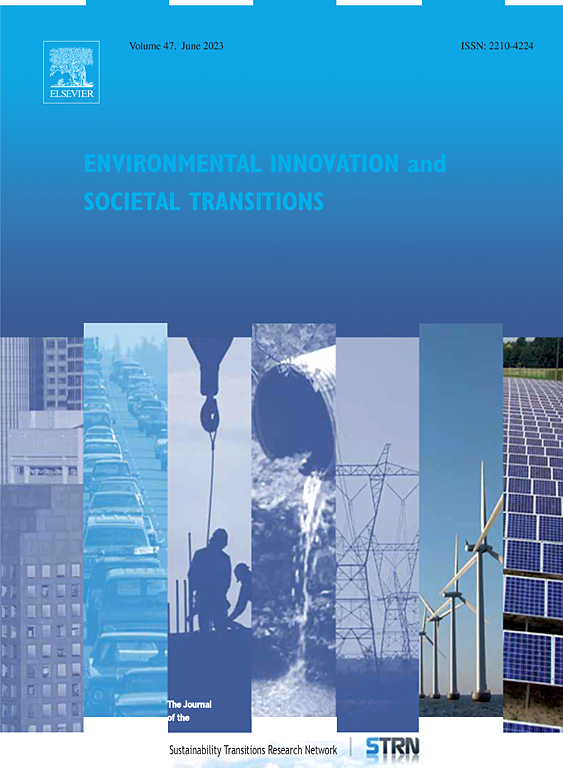Mapping the hydrogen transition in the Netherlands: A sociotechnical multi-system event sequence analysis
IF 5.7
2区 经济学
Q1 ENVIRONMENTAL SCIENCES
Environmental Innovation and Societal Transitions
Pub Date : 2025-04-23
DOI:10.1016/j.eist.2025.100999
引用次数: 0
Abstract
Hydrogen is considered a promising energy carrier that can potentially contribute to low-carbon energy systems and achieving climate goals. Its introduction, however, is complex, involving multiple emerging niches and developments across various sociotechnical systems. Despite its significance, the multi-system nature of hydrogen has received limited attention in sustainability transition scholarship. This paper addresses this knowledge gap by examining the emerging hydrogen transition in the Netherlands from a multi-system sociotechnical perspective. To achieve this, we adopted a framework that considers multiple niches and sociotechnical systems in parallel, using Event Sequence Analysis (ESA). The analysis provides a systematic reconstruction of (niche-)processes as networks of events for analysing hydrogen niche formation from 2001 to 2020 across four sociotechnical systems: industry, electricity, transport, and the built environment. The results reveal that, despite positive discourse and ambitious plans, investments and implementation remained limited. We provide possible explanations for this progress through a multi-system lens.
绘制荷兰氢过渡:社会技术多系统事件序列分析
氢被认为是一种有前途的能源载体,可以潜在地为低碳能源系统和实现气候目标做出贡献。然而,它的引入是复杂的,涉及多个新兴的利基和跨各种社会技术系统的发展。尽管具有重要意义,但氢的多系统性质在可持续性转型研究中受到的关注有限。本文通过从多系统社会技术角度研究荷兰新兴的氢过渡来解决这一知识差距。为了实现这一点,我们采用了一个框架,该框架使用事件序列分析(ESA)并行考虑多个利基和社会技术系统。该分析提供了一个系统的(生态位)过程的重建,作为分析2001年至2020年四个社会技术系统(工业、电力、交通和建筑环境)中氢生态位形成的事件网络。结果表明,尽管有积极的话语和雄心勃勃的计划,但投资和实施仍然有限。我们通过多系统视角为这一进展提供可能的解释。
本文章由计算机程序翻译,如有差异,请以英文原文为准。
求助全文
约1分钟内获得全文
求助全文
来源期刊

Environmental Innovation and Societal Transitions
Energy-Renewable Energy, Sustainability and the Environment
CiteScore
13.60
自引率
19.40%
发文量
90
审稿时长
56 days
期刊介绍:
Environmental Innovation and Societal Transitions serves as a platform for reporting studies on innovations and socio-economic transitions aimed at fostering an environmentally sustainable economy, thereby addressing structural resource scarcity and environmental challenges, particularly those associated with fossil energy use and climate change. The journal focuses on various forms of innovation, including technological, organizational, economic, institutional, and political, as well as economy-wide and sectoral changes in areas such as energy, transport, agriculture, and water management. It endeavors to tackle complex questions concerning social, economic, behavioral-psychological, and political barriers and opportunities, along with their intricate interactions. With a multidisciplinary approach and methodological openness, the journal welcomes contributions from a wide array of disciplines within the social, environmental, and innovation sciences.
 求助内容:
求助内容: 应助结果提醒方式:
应助结果提醒方式:


